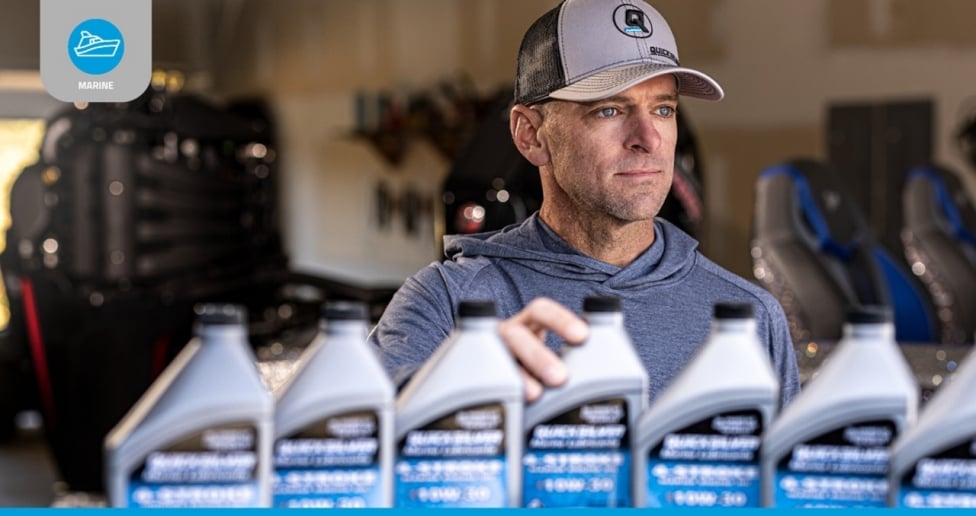Marine oil is formulated for water-based engines, while regular oil is for land-based engines. Marine oil resists moisture and corrosion.
Marine oil and regular oil serve different purposes. Marine oil is specifically designed for marine engines, which operate in water-based environments. These oils include additives that prevent moisture damage and corrosion, ensuring optimal engine performance. Regular oil, used in cars and other land-based vehicles, lacks these specialized additives.
It focuses more on dealing with dust, dirt, and varying temperatures. Choosing the right oil is crucial for the longevity and efficiency of your engine. Using the wrong type can lead to engine damage and decreased performance, making it essential to understand their distinct characteristics.

Credit: www.thefisherman.com
Introduction To Marine Oil And Regular Oil
Oils are essential for the smooth operation of engines. They reduce friction and wear. But not all oils are the same. Marine oil and regular oil serve different purposes. Let’s explore their unique features.
Characteristics Of Marine Oil
- Designed for marine engines
- Resistant to high moisture environments
- Contains additives to prevent corrosion
- Thicker and more viscous
- Handles extreme temperature changes
Characteristics Of Regular Oil
- Used in everyday vehicles
- Optimized for land-based engines
- Less resistant to moisture
- Contains fewer corrosion inhibitors
- Thinner and less viscous

Credit: www.quicksilver-products.com
Key Components And Formulation
Understanding the key components and formulation of marine oil and regular oil is essential. These oils serve different purposes and environments. Their composition affects performance and efficiency. Let’s explore what sets them apart.
Base Oils And Additives In Marine Oil
Marine oil is specially designed for watercraft engines. It must handle harsh marine conditions. The base oils in marine oil are typically more refined. They offer higher resistance to oxidation and corrosion.
Additives in marine oil are unique. They include anti-rust agents, detergents, and dispersants. These additives help combat the salty, humid marine environment. They ensure the engine runs smoothly and lasts longer.
Base Oils And Additives In Regular Oil
Regular oil is used in cars, trucks, and other land vehicles. The base oils in regular oil are designed for varied driving conditions. These oils balance performance with cost-effectiveness.
Additives in regular oil differ from marine oil. They include friction modifiers, anti-wear agents, and detergents. These additives enhance engine cleanliness and efficiency. They also help to reduce engine wear and tear.
| Component | Marine Oil | Regular Oil |
|---|---|---|
| Base Oils | Highly Refined, Oxidation Resistant | Balanced for Performance and Cost |
| Additives | Anti-Rust, Detergents, Dispersants | Friction Modifiers, Anti-Wear Agents, Detergents |
Viscosity And Performance In Different Environments
Viscosity is how thick or thin the oil is. It affects how oil flows. Performance in different environments varies due to viscosity. Marine oil and regular oil serve different purposes. Let’s explore their characteristics.
Marine Oil In Waterborne Conditions
Marine oil is designed for watercraft engines. It performs well in wet conditions. Marine oil has special additives. These additives prevent rust and corrosion. Water can easily cause these issues.
Marine oil has high shear stability. This means it stays effective under stress. Engines in boats work harder. Marine oil keeps the engine running smoothly. It is also resistant to water contamination. Regular oil can mix with water. Marine oil does not mix easily.
Regular Oil In Terrestrial Conditions
Regular oil is for cars, trucks, and other land vehicles. It works best in dry conditions. Regular oil has its own set of additives. These additives help with engine cleanliness. They also improve fuel efficiency.
Regular oil has lower shear stability compared to marine oil. It is suitable for moderate stress levels. Land vehicles do not face as much engine stress. Regular oil is not designed to resist water. It can get contaminated if mixed with water.
| Aspect | Marine Oil | Regular Oil |
|---|---|---|
| Environment | Waterborne Conditions | Terrestrial Conditions |
| Shear Stability | High | Lower |
| Water Contamination Resistance | High | Low |
| Corrosion and Rust Prevention | Yes | No |
Impact On Engine Wear And Tear
Understanding the impact on engine wear and tear is vital. The right oil can make a huge difference. Marine oil and regular oil have distinct properties. These properties affect engine wear and tear in various ways.
Protective Qualities Of Marine Oil
Marine oil is specially designed for watercraft engines. These engines face harsh conditions. Marine oil has specific additives. These additives provide extra protection. They help to combat corrosion and rust. They also reduce the impact of saltwater exposure.
Marine oil maintains its viscosity in extreme conditions. This ensures the engine runs smoothly. It helps prevent metal parts from wearing out quickly. Marine oil also reduces friction. This results in less engine wear and tear.
Protective Qualities Of Regular Oil
Regular oil is used in most cars and trucks. It is designed for engines that operate on land. Regular oil provides basic lubrication. It helps to reduce friction between moving parts. This reduces engine wear and tear.
Regular oil also helps to keep the engine clean. It prevents sludge and deposits from forming. This ensures a longer engine life. Regular oil is not suitable for marine conditions. It lacks the additives needed to protect against saltwater and corrosion.
Corrosion Resistance Capabilities
Understanding the corrosion resistance capabilities of marine oil and regular oil is crucial. Each type of oil has unique properties that protect machinery and engines from rust and wear. Learn how marine oil and regular oil differ in their fight against corrosion.
Marine Oil Against Saltwater Corrosion
Marine oil is specially formulated to resist saltwater corrosion. It has additives that protect engines from rust. These additives form a protective barrier on metal surfaces.
Saltwater is highly corrosive. Marine oil’s unique composition ensures long-lasting protection. It also contains anti-oxidants to prevent engine wear. These properties make marine oil essential for boats and ships.
Regular Oil And Corrosion Protection
Regular oil offers basic corrosion protection. It is designed for use in cars and trucks. Regular oil contains fewer anti-corrosion additives compared to marine oil.
Regular oil helps reduce engine wear and tear. It does not provide the same level of protection against saltwater. Regular oil is suitable for environments with less exposure to moisture and salt.
| Feature | Marine Oil | Regular Oil |
|---|---|---|
| Corrosion Resistance | High | Moderate |
| Saltwater Protection | Excellent | Low |
| Anti-Oxidants | Yes | Limited |
| Application | Marine Engines | Cars & Trucks |
Environmental Considerations
Understanding the environmental considerations of marine oil and regular oil is crucial. These oils affect our planet differently. Let’s dive into their impact on nature.
Biodegradability Of Marine Oil
Marine oil is designed to break down faster in water. This makes it biodegradable. It’s less harmful to sea life. Marine oil contains fewer harmful chemicals. These oils help protect ocean ecosystems.
Key features of marine oil:
- Breaks down quickly in water
- Less toxic to marine life
- Contains fewer harmful substances
Environmental Impact Of Regular Oil
Regular oil can be more harmful to the environment. It often contains toxic chemicals. These can harm plants and animals. Regular oil doesn’t break down as fast. This can lead to long-term pollution.
Key concerns with regular oil:
- Contains toxic chemicals
- Slow to biodegrade
- Can cause long-term pollution
| Feature | Marine Oil | Regular Oil |
|---|---|---|
| Biodegradability | High | Low |
| Toxicity | Low | High |
| Environmental Impact | Less harmful | More harmful |
Cost Analysis And Accessibility
Understanding the cost and accessibility of marine oil and regular oil is essential. Both types of oil have unique pricing and availability factors. This section covers the critical aspects of cost and accessibility.
Pricing Of Marine Oil
Marine oil is specifically designed for boats and marine engines. It often costs more than regular oil. The high cost is due to its unique formulation. Marine oil contains additives that protect engines from saltwater corrosion. These additives increase the price.
Here’s a simple comparison:
| Oil Type | Average Price per Gallon |
|---|---|
| Marine Oil | $25 – $40 |
| Regular Oil | $15 – $25 |
Availability And Pricing Of Regular Oil
Regular oil is commonly used in cars and trucks. It is widely available and easy to find. You can purchase it at gas stations, supermarkets, and auto parts stores.
Regular oil is usually cheaper than marine oil. This is because it does not need the special additives that marine oil requires. Regular oil prices vary based on brand and type. Synthetic oil is more expensive than conventional oil.
- Conventional Oil: $15 – $20 per gallon
- Synthetic Oil: $20 – $25 per gallon
In summary, marine oil tends to be more expensive and specialized. Regular oil is more affordable and widely available.

Credit: www.youtube.com
Choosing The Right Oil For Your Needs
Understanding the difference between marine oil and regular oil is crucial. Each type of oil has its own unique properties. Knowing these can help you make an informed decision. This ensures your engine performs optimally and lasts longer.
Factors To Consider
- Environment: Marine engines operate in water. This requires oil that can handle moisture and salt.
- Temperature: Marine engines often run at lower temperatures. Regular oil is designed for higher temperatures found in cars.
- Additives: Marine oil has special additives. These help in resisting rust and corrosion.
- Viscosity: The thickness of the oil matters. Marine oil has a different viscosity compared to regular oil.
Recommendations For Various Applications
| Application | Recommended Oil |
|---|---|
| Outboard Motors | Use marine oil. It handles moisture well. |
| Inboard Engines | Marine oil is best. It resists corrosion. |
| Automobiles | Regular oil is suitable. It handles high temperatures. |
| Motorcycles | Use regular oil. It provides necessary lubrication. |
Choosing the right oil can make a big difference. It affects the performance and lifespan of your engine. Always check the manufacturer’s recommendations. They know what’s best for your engine.
Frequently Asked Questions
What Is Marine Oil?
Marine oil is specifically designed for marine engines. It has additives to prevent corrosion and withstand high humidity.
How Is Marine Oil Different From Regular Oil?
Marine oil contains additives that regular oil lacks. These additives protect against corrosion and water contamination.
Can I Use Regular Oil In A Marine Engine?
Using regular oil in a marine engine is not recommended. It lacks the necessary additives to protect against marine conditions.
Why Does Marine Oil Cost More?
Marine oil costs more due to specialized additives. These additives protect against corrosion and ensure engine longevity in harsh conditions.
Conclusion
Understanding the difference between marine oil and regular oil is crucial for engine maintenance. Marine oil offers specific benefits for marine engines, while regular oil suits everyday vehicles. Choose the right oil to ensure optimal performance and longevity. Proper oil selection can prevent engine wear and extend service life.


